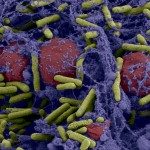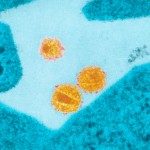Link to Pubmed [PMID] – 18274673
J. Clin. Invest. 2008 Mar;118(3):1074-84
Leukocytes from individuals with warts, hypogammaglobulinemia, infections, and myelokathexis (WHIM) syndrome, a rare immunodeficiency, and bearing a wild-type CXCR4 ORF (WHIM(WT)) display impaired CXCR4 internalization and desensitization upon exposure to CXCL12. The resulting enhanced CXCR4-dependent responses, including chemotaxis, probably impair leukocyte trafficking and account for the immunohematologic clinical manifestations of WHIM syndrome. We provided here evidence that GPCR kinase-3 (GRK3) specifically regulates CXCL12-promoted internalization and desensitization of CXCR4. GRK3-silenced control cells displayed altered CXCR4 attenuation and enhanced chemotaxis, as did WHIM(WT) cells. These findings identified GRK3 as a negative regulator of CXCL12-induced chemotaxis and as a candidate responsible for CXCR4 dysfunction in WHIM(WT) leukocytes. Consistent with this, we showed that GRK3 overexpression in both leukocytes and skin fibroblasts from 2 unrelated WHIM(WT) patients restored CXCL12-induced internalization and desensitization of CXCR4 and normalized chemotaxis. Moreover, we found in cells derived from one patient a profound and selective decrease in GRK3 products that probably resulted from defective mRNA synthesis. Taken together, these results have revealed a pivotal role for GRK3 in regulating CXCR4 attenuation and have provided a mechanistic link between the GRK3 pathway and the CXCR4-related WHIM(WT) disorder.


